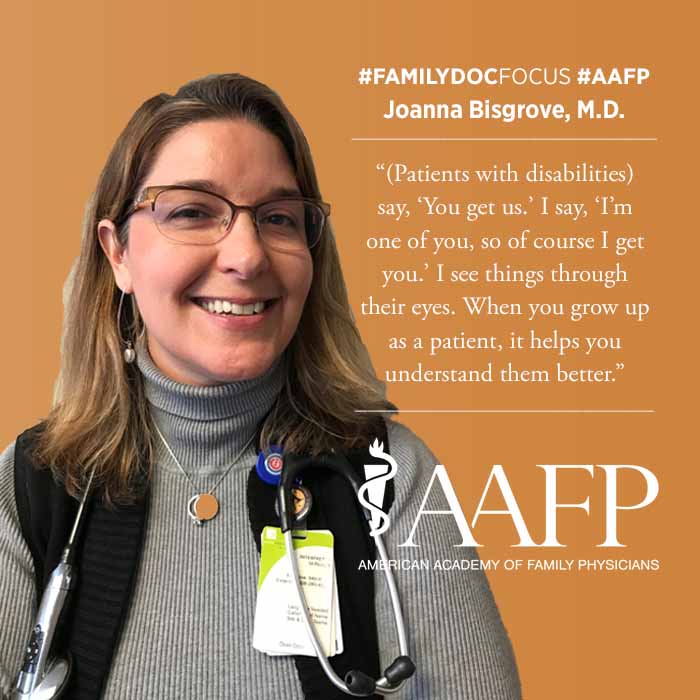FP Turns Self-Advocacy Into Advocacy for Family Medicine
February 24, 2020 02:37 pm David Mitchell -- During its 2017 Interim Meeting in Honolulu, the AMA House of Delegates was debating an amendment to a resolution that would have softened the organization's stance on the Americans with Disabilities Act by backing off on support for making physicians' offices accessible.

Joanna Bisgrove, M.D., wasn't having it. She went to the microphone, pulled back her hair to reveal her assistive listening device, and reminded delegates how the ADA helped her and her patients stay on equal footing with those who did not have disabilities.
The resolution was adopted -- minus the amendment.
"I shot it down," she said. "I was brief but to the point. This matters to me."
Bisgrove, a third-generation doctor who followed her radiologist father and obstetrician grandfather into the field, originally planned to be a physician for deaf and hard-of-hearing patients, but her panel includes patients with a wide range of disabilities.
"They say, 'You get us,'" she said. "I say, 'I'm one of you, so of course I get you.' I see things through their eyes. When you grow up as a patient, it helps you understand them better."
Bisgrove was born with mild hearing loss in her left ear. After a bout of viral meningitis at age 9, her hearing got worse. She eventually needed hearing aids in both ears.
"When I was a kid, people made fun of me because of my lisp," she said. "Kids bullied me and talked about me behind my back. I had to learn to advocate for myself as a young person, because of hearing loss, to get what I needed."
For example, when Bisgrove had a hard time keeping up in an undergraduate chemistry class at Cornell University, she fought for and ultimately was allowed to have assistance from a notetaker. She later won a similar argument with her employer about having a scribe's assistance in her clinic.
"It's always challenging," she said.
Bisgrove wasn't satisfied with being an advocate for herself. She wanted to do more. When a brochure for the AAFP's National Conference of Special Constituencies arrived in her mailbox in 2011, she called her chapter president and asked, "What is this and how do I get there?"
Bisgrove was appointed the Wisconsin AFP's new physician representative, and for eight years in a row, she attended the annual event -- which has since been renamed the National Conference of Constituency Leaders and will meet again April 23-25 in Kansas City, Mo.
During that first trip to NCSC, Bisgrove ran to be the AAFP's delegate to the AMA Young Physicians Section and lost. After the results were announced, the physician seated next to her offered some sage advice.
"Run again next year," said Robyn Liu, M.D., M.P.H.
"Are you serious?" Bisgrove asked.
"Yes," said Liu, who won the election for new physician member of the Academy's Board of Directors that year after losing the same contest a year earlier.
So Bisgrove ran for leadership posts at the next two NCSC meetings but lost both times. In 2014, a physician who had defeated her in a previous election encouraged her to try one more time and helped craft her campaign speech. That year, Bisgrove was elected the AAFP's delegate to the AMA Young Physicians Section and has been part of the Academy's AMA delegation ever since.
"Everyone helps everyone else," Bisgrove said of NCCL. "You make friends for life, and there are so many good people. It's truly a community of people who want to do what's best for patients and are inclusive of all people. It's so important to have that community."
Since 2014, Bisgrove has been the co-chair of her chapter's legislative committee. She also has served on her health system's board of directors and is now a member of its finance committee.
"It all started with that one phone call with that NCSC brochure in my hand," Bisgrove said. "Everyone has a voice, and everyone deserves to learn how to use it."
Bisgrove didn't have to go to NCCL to find strong female role models. All four of her grandparents were Jews who fled Ukraine in the 1920s. Her maternal grandmother became a pharmacist, her mother a lawyer.
"If you get an education, you can be anything you want," Bisgrove said. "That was the philosophy passed on to my mom and shared by my dad."
Bisgrove is a member of the AMA Women Physicians Section Governing Council and also serves on the steering committee for the multi-institutional Women in Medicine Summit. She will be giving a presentation during that event that covers topics such as writing resolutions, testifying in committees and talking with legislators. The summit is scheduled for Oct. 9-10 in Chicago, days before the AAFP's Congress of Delegates convenes in the Windy City.
"This isn't about women taking over," she said. "It's about everything being equal for everyone."